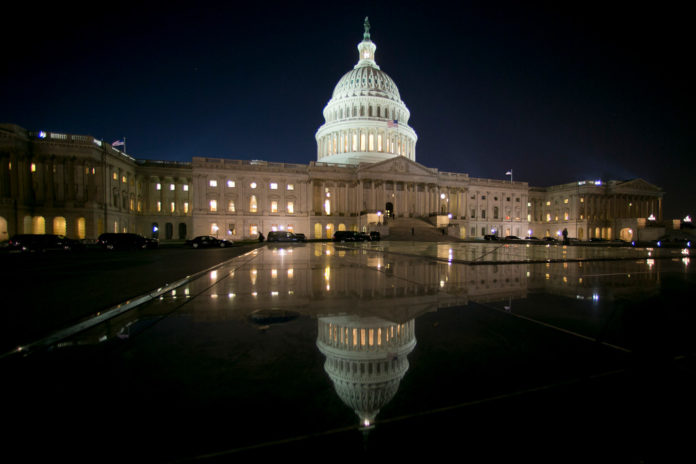
WASHINGTON – The House of Representatives voted on Tuesday to suspend the U.S. debt limit until March 2015, giving a win to President Barack Obama and Democrats in Congress who insisted that the ceiling be lifted without conditions.
The measure passed 221-201.
The plan goes to the Democratic-led Senate, where Majority Leader Harry Reid said the chamber will act as soon as possible. Obama and Senate Democrats had refused to negotiate on raising the debt limit, and U.S. companies sought assurance that the government wouldn’t exhaust its borrowing authority.
House Minority Whip Steny Hoyer, a Maryland Democrat, said the issue comes down to whether the U.S. will make good on its obligations to debt-holders and provide stability by boosting the limit.
“Will America pay its bills?” Hoyer said on the House floor before the vote. “Will it give confidence to the business community? Will it give confidence to its own citizens? Will it indeed give confidence to the world?”
Republicans have been divided over spending issues. Fewer than half of House Republicans voted last year for measures that averted spending cuts and tax increases, assisted victims of domestic and sexual violence and provided aid for victims of Hurricane Sandy. Republicans needed Democratic votes to pass a budget deal in December and a farm bill last month.
Ted Cruz
Sen. Ted Cruz, a Texas Republican, said he will insist on requiring at least 60 votes to advance the debt-limit measure instead of a simple majority of the 100 senators.
Responding to criticism that he was forcing five Republicans to join Democrats in passing the bill, Cruz told reporters, “Republicans in the Senate and House should stand united” to “stop digging the debt hole deeper and deeper.”
Second-ranking Senate Democrat Dick Durbin of Illinois, asked whether that chamber would have 60 votes to advance the measure, said, “I think so, if 60 votes are required.”
Two House Democrats, Jim Matheson of Utah and John Barrow of Georgia, joined most Republicans in voting against the measure. Among the 28 Republicans supporting it were Speaker of the House John Boehner of Ohio, House Majority Leader Eric Cantor of Virginia, Ways and Means Committee Chairman Dave Camp of Michigan and Appropriations Committee Chairman Hal Rogers of Kentucky.
“Our members are also very upset with the president,” Boehner, an Ohio Republican, told reporters Tuesday. “He won’t negotiate. He won’t deal with our long-term spending problems without us raising taxes, won’t even sit down and discuss these issues. He’s the one driving up the debt.”
218 votes
Boehner, asked whether advancing the bill was a recognition that Republicans lack political leverage after October’s 16-day partial government shutdown, said, “It’s the fact that we don’t have 218 votes. And when you don’t have 218 votes, you have nothing.”
Republicans said after the shutdown that they wouldn’t again risk breaching the debt limit and wanted to move on to other issues after public opinion polls largely blamed them for the impasse. House Republican leaders are emphasizing their opposition to Obamacare leading up to the November election.
A suspension of the U.S. debt limit enacted by Congress in October expired Feb. 7. Treasury Secretary Jacob J. Lew said last week that borrowing authority may not last past Feb. 27.
Muted increases in Treasury bill rates this month signaled that investors saw little risk that U.S. lawmakers wouldn’t raise the nation’s borrowing limit on time.
Treasury bills
One-month bill rates slid to 0.05 percent from a high of 0.14 percent at the beginning of the month. The rates surged as high as 0.45 percent in October before lawmakers agreed to suspend the debt limit.
Last night, Republicans said they would move a debt-limit increase that would include benefits for military retirees. The House passed the benefits proposal as a separate measure on Tuesday, and the Senate is considering a different version.
“I think it’s great the speaker’s bringing up a clean debt limit,” Vice President Joe Biden said in an interview at the Capitol Tuesday after he swore in new Montana Democratic Sen. John Walsh.
Business groups have urged Congress to raise the debt ceiling as soon as possible to assure companies that the U.S. government won’t default on its obligations.
The U.S. Chamber of Commerce, the country’s largest business lobbying group, said in a letter to lawmakers on Monday that quick passage would avoid “collateral stresses so often inflicted during similar episodes in recent years.”
Government shutdown
A dispute over raising the debt limit was among the issues that led to the shutdown in October. House Republicans tried repeatedly to attach policy provisions curbing Obamacare and promoting the Keystone XL pipeline in exchange for raising the debt cap and funding the government.
Sen. Charles Schumer, a New York Democrat, said in a statement, “The House has come to the realization that following the hard right on the debt ceiling made no sense.” He said he hoped the party would “come to the same realization on immigration.”
The speaker’s move signals that, even as some Tea Party-backed lawmakers may have wanted to attach policy changes, the ranks of such Republicans are dwindling, said Julian Zelizer, a history professor at Princeton University.
“They’re in a difficult political position,” Zelizer said. “I do think it signals this is not a strategy they plan to continue in the near term.”
Budget office
The U.S. Congressional Budget Office reported last week that the budget deficit this year will be the smallest as a share of the economy since 2007 as stronger economic growth boosts tax revenue.
The CBO said the deficit will narrow to $514 billion this fiscal year, or 3 percent of gross domestic product, from $680 billion in 2013 before surging to $1.07 trillion in a decade.
Polls show that the issue of deficit reduction is declining as a priority for U.S. adults. A Jan. 15-19 poll by the Pew Research Center found that for the first time since Obama took office, the deficit slipped as a top item, with 63 percent of those polled saying that closing the budget gap should be a top priority for Congress and the White House. That’s down from 72 percent a year ago.
The poll of 1,504 adults had a margin of error of plus or minus 2.9 percentage points.












